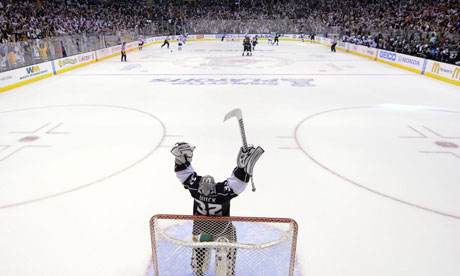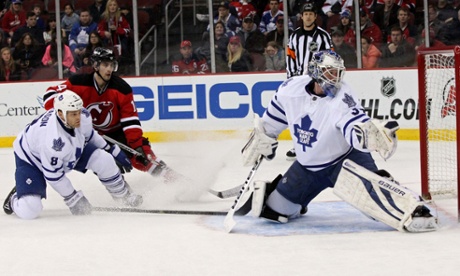So swiftly did the LA Kings and the Phoenix Coyotes finish off their semi-final opponents, that they will this weekend start off the Western Conference final, bidding for a place in the Stanley Cup, while the eastern conference is still concluding its semi-finals. The New York Rangers and the Washington Capitals have gone to Game 7 in both the quarters and the semis. The winner will face the New Jersey Devils in the Eastern Conference final. Here's how this weekend's playoffs matchup:
Kings vs. Coyotes: The space between
So can we all agree that nobody saw this coming? A matchup between these two teams for the conference championship was never on any serious radar until at least the end of the first round, and even then both the Blues and Predators seemed to be rolling at such a pace that dreams in California and Arizona were bound to be crushed. Not so. And what we're left with is the possibility of a very close conference final series – one to likely be dominated tight defensive play and few goals. Which is interesting, given we are well into the post-lockout phase of the NHL and deep into the time period when we were supposed to see the game open up and when defensive contests were a thing of some long-ago New Jersey Devils trap phase of life. But here we are.
Obvious also to anybody who's been watching so far is that this will probably be the most epic of goaltending matchups that we've certainly seen all playoffs and likely for quite some time. The Luongo-versus-Thomas bill of last spring was definitely a sight to behold, but both the Bruins and Canucks were known as much for their offensive style and goalscoring as anything going on between the pipes. As well, we were at that point watching two goalies that had been around for some time, and while Thomas' age didn't seem to match his performance, when neither seemed able to replicate their feats this year, the age factor was – perhaps -– an acceptable excuse.
Now, we get to see two young goalies (Jonathan Quick was born in 1986; Mike Smith in 1982) at very much the prime of their careers. Both have been stellar this postseason, backstopping their teams consistently and often making those highlight saves that keep everyone together long enough either to eek out a close win or simply just give their team enough time to get that go-ahead goal. Some quick stats: Smith is 8-3, has a 1.70 GAA with a.948 save percentage. Huge. Quick is sitting at 8-1, boasting a 1.55 GAA and .949 save percentage. Huger. It's just too close to call on that alone.
Whether both will be able to replicate their performances in the coming days and weeks? We might actually have to look at the rest of their teams to determine the likelihood of that.
This is where we find the goal-scoring potential – and, given what I've just gone over, I really do mean only potential. But the Kings are winning on this front. They have already dismantled two all star goalies on the way to this point (Luongo and Elliott) and against the Canucks, were able to out-score a high-powered offence. They're also getting scoring from everywhere. As of their last game, 14 different players on the Kings had scored during the playoffs, which means that, yes, all their lines are rolling.
And this is where the Coyotes could have some trouble. They've been winning close games, many in overtime, and most really by virtue of Smith. They have to start scoring more, and earlier.
So if you take the goalies at a wash, you're really left with two teams up front that look very similar except perhaps where it might matter most: goals. For the Kings, the key will be staying out of the box, being physical (they're a bigger team), making better use of their power play (which stinks), and getting those big bodies in front of Smith (who's no slouch himself). As for the 'Yotes... well, they need to score, especially if they're given the chance with the man advantage. And if they can frustrate the Kings enough, they could have those opportunities.
Prediction: All that being said, I'll take the underdog for once. Coyotes in 7.
Another Game 7 in New York City
A familiar scenario. The Rangers are back at home in a Game 7 facing the task of having to do away with yet another upstart team from a national capital. Last time, they managed to fight off Ottawa. Can they do the same to Washington, a team that has become surprisingly tight and organized as the playoffs have gone on? It's worth remembering it was the Caps that replaced their head coach only a few months into the regular season, and were desperately trying to get any kind of consistent production out of its multi-million dollar captain. No matter what happens Saturday, this season has been a success.
Because now here they are, on the cusp of the Eastern conference final, pushing the first-placed team to the brink. Over at the National Post, Bruce Arthur notes some of the things that Caps' coach Dale Hunter has managed to do since he arrived from London.
"He reduced the ice time of the team's stars, created less puck possession for his team, and produced more time in Washington's defensive end. He has carved out increased roles for of a posse of grinding pros like Jay Beagle, Joel Ward, Jason Chimera, Troy Brouwer, Mike Knuble, and especially in Game 6 in Washington, Matt Hendricks."
Hunter is also one half of the reason this series has become as much a contest of blocking shots as it has one of scoring goals – the other being, of course, John Tortorella, over in the other bench. There's been a lot of talk in the last week about how shot blocking might be the newest demise of the game, mostly thanks to a column David Brooks wrote at the New York Post, where he posited this:
"The blocked shot and coaches' obsession with it as a means toward ending an opponents' season have become hockey's version of baseball's pitch count, an art that might lead to victory but has made the game less entertaining and has perverted the framers' original intent."
But as Harrison Mooney at Yahoo's Puck Daddy points out, with the help of some historical figures from the 2006 finals, "you're not watching the future of hockey. You're just watching two excellent shot-blocking teams go head to head."
So far, blocking has kept things even closer than they might have been if the goalies had actually been forced to save the majority of those shots (which would quite possibly have given this series a different look, given it would have pitted Lundqvist against Holtby more directly). And whatever you think of it, there's bound to be more Saturday, given a conference title spot is on the line.
As for Game 7, it might be easy to speculate that given how close these games have been, that the first goal will be critical. That's been true so far in this series, but it hasn't meant that the team to score first runs away with it. As we all know, we especially have to watch for the Rangers late in the game. Twice now in consecutive games, the Rangers have been able to put one away very late – a little too late in Game 6, but nevertheless, with a guy like Brad Richards circling around, it's never out of the realm of possibility.
For the Rangers, the key for Saturday is to stay composed, and knowing that the Caps will be throwing themselves to the ice, the primary word for them to remember will be 'patience'. If at all possible, the Rangers need to keep calm, wait, and open up new shooting lanes at every opportunity by staying mobile and using the width of the ice to stretch the Caps' defence, offering up more ice. And for goodness sake, get some people in front of Holtby.
For the Caps, much the same applies, but certainly they need to keep the physical pressure on the Rangers, and use the dump-and-chase as much as possible. They've proved already they can hold off sustained Rangers pressure for long periods, which has been frustrating for New York. Washington needs more of that. Also, the Rangers like to come out strong, so if the Caps can pull off a rope-a-dope style of game, they might grab a goal late in the period.
This one is such a tough call, so I won't predict anything apart from saying it will be a good one.











